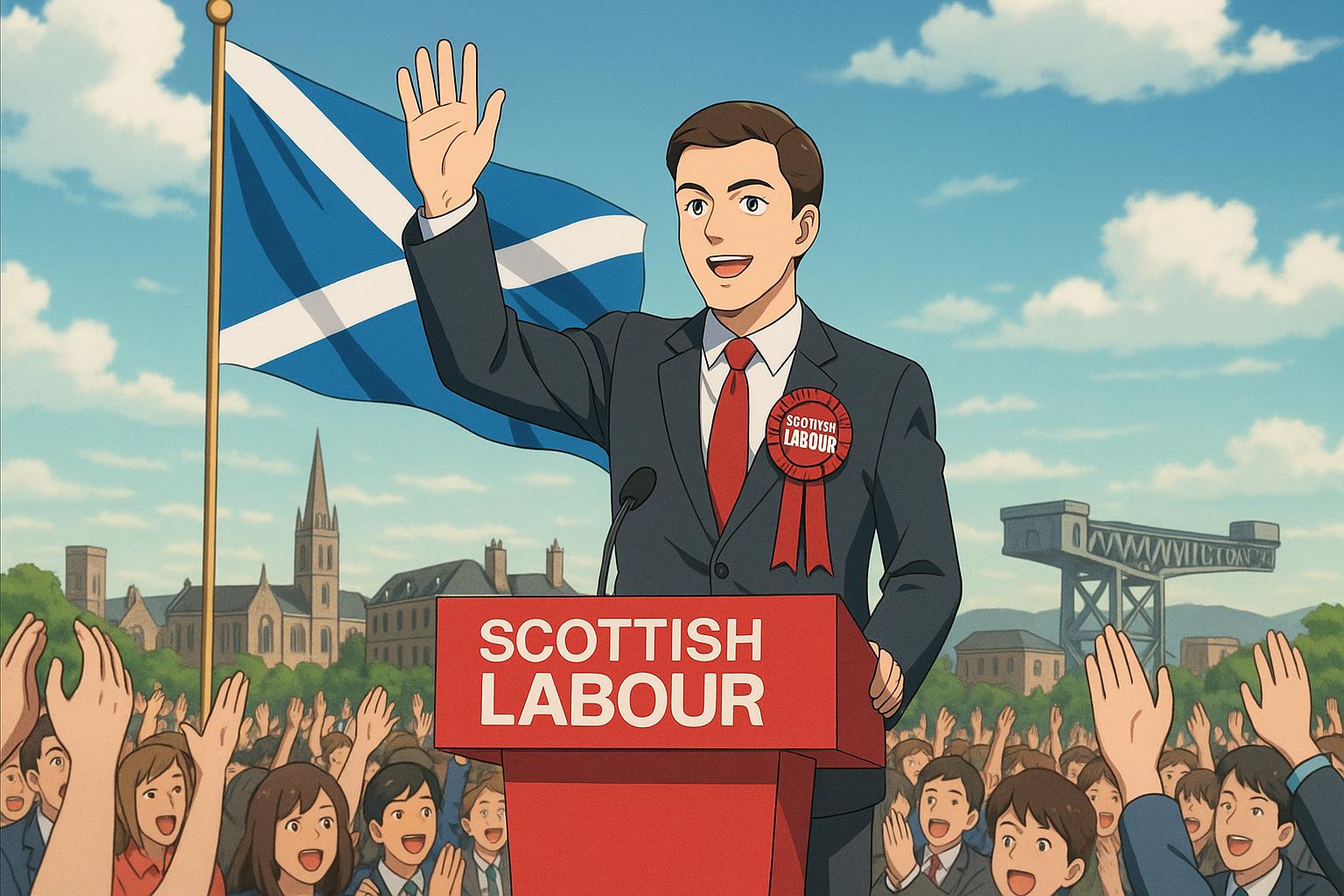Scottish Labour has made significant gains in recent by-elections, with victories in Hamilton, Larkhall and Stonehouse and Rutherglen and Hamilton West highlighting voter frustration with the SNP government and a desire for political change ahead of the next general election.
Scottish Labour has marked a significant resurgence in the political landscape, most notably demonstrated by their triumph in the Hamilton, Larkhall and Stonehouse by-election. This victory not only confirms the party’s momentum but also indicates a shift in voter sentiment across Scotland. As Davy Russell, the newly elected Member of the Scottish Parliament (MSP), celebrates his win, he insists that it signifies a critical juncture in Scottish politics, framing it as a choice between the stagnation of the SNP government and the hopeful vision offered by Labour.
Russell articulated a clear message in light of this victory, highlighting it as a step towards dismantling nearly two decades of SNP governance. According to him, the people of Hamilton, Larkhall and Stonehouse have taken a stand for substantive change, rejecting what he describes as the SNP’s “desperate spin”. He noted, “Scotland has almost one in six Scots on an NHS waiting list. […] it’s no wonder the SNP cannot stand on its own record.” The sentiment echoed across many debates leading up to the election underscored a collective frustration with public services, housing issues, and the disconnection people feel from politics.
Similar sentiments have emerged from other recent by-elections, including the one in Rutherglen and Hamilton West, where Labour’s Michael Shanks achieved a substantial 20.4% swing from the SNP, securing 17,845 votes against the SNP’s Katy Loudon, who garnered 8,399 votes. The SNP attributed their losses to “contextual factors”, including the internal turmoil from the ousting of former MP Margaret Ferrier due to COVID-19 breaches and ongoing financial investigations. Additionally, there is mounting pressure on SNP leader Humza Yousaf following these electoral setbacks, as questions arise regarding his leadership and the party’s focus on independence amidst ongoing economic challenges.
This wave of discontent is significant against the backdrop of Scotland’s political history, where the SNP has maintained a stronghold. Reports suggest that the party may face up to a two-thirds loss of its seats in the upcoming general election, a development that underscores Labour’s potential to reclaim its position in Scotland’s political hierarchy. As Labour leader Anas Sarwar prepares for upcoming contests, he insists that the roots of this change are being planted now, with the party’s focus firmly on offering hope as opposed to despair.
In conversations across communities, many voters expressed dissatisfaction with the current political landscape, articulating a yearning for genuine change rather than the status quo. “People feel a sense of hopelessness – they can’t rely on public services, the economy doesn’t work for them,” Russell noted, reflecting the sentiment that appears to herald a broader shift in political allegiances. As Labour seeks to harness this momentum, the discourse around the by-elections signifies a potential turning point for Scottish politics, where whoever can present a viable alternative to the SNP’s long-standing governance could reshape the future landscape.
The recent electoral victories reinforce the narrative that many Scottish voters are ready for a transformative shift. Russell’s assertion that Hamilton, Larkhall and Stonehouse have chosen “the politics of hope over the politics of despair” appears to resonate with a larger narrative unfolding across Scotland. As the next general election approaches, the electorate seems poised to make their voices heard once again, potentially propelling Labour into a position of renewed influence.
 Reference Map:
Reference Map:
Source: Noah Wire Services
- https://www.dailyrecord.co.uk/news/politics/voters-hamilton-chose-hope-over-35357045 – Please view link – unable to able to access data
- https://www.bbc.co.uk/news/uk-scotland-67024848 – Labour’s Michael Shanks secured a decisive victory in the Rutherglen and Hamilton West by-election, defeating the SNP’s Katy Loudon with 17,845 votes to 8,399. This 20.4% swing from SNP to Labour is seen as a significant boost for the party ahead of the next general election. The by-election was triggered by the ousting of former SNP MP Margaret Ferrier, who was expelled after breaching COVID-19 restrictions in 2020. The low voter turnout of 37.2% is noted as a concern for the SNP.
- https://www.standard.co.uk/news/politics/snp-humza-yousaf-margaret-ferrier-bbc-radio-scotland-hamilton-b1111915.html – SNP leader Humza Yousaf acknowledged the party’s defeat in the Rutherglen and Hamilton West by-election, attributing it to ‘contextual factors’ such as Margaret Ferrier’s actions and the ongoing police investigation into the SNP’s finances. He stated that the SNP must reflect, regroup, and reorganise to come back stronger. The by-election saw a 20.4 percentage point swing to Labour, with Michael Shanks winning 17,845 votes compared to Katy Loudon’s 8,399.
- https://www.theguardian.com/politics/2023/oct/06/what-labour-rutherglen-victory-means-for-snp-and-uk-politics – Labour’s victory in the Rutherglen and Hamilton West by-election is seen as a significant challenge to the SNP’s dominance in Scottish politics. The low voter turnout of 37.2% and internal divisions within the SNP are highlighted as factors contributing to the defeat. The result is expected to increase pressure on SNP leader Humza Yousaf, with internal critics questioning his leadership and the party’s direction on independence.
- https://www.ft.com/content/8d5d1fef-7682-41a5-aed7-a2cb18052832 – The SNP’s decade-long dominance in Scottish politics is facing significant challenges, including internal scandals and economic issues. The party is projected to lose up to two-thirds of its seats in the upcoming UK general election. Labour, under leader Anas Sarwar, is expected to reclaim many seats, indicating a potential shift in Scotland’s political landscape.
- https://www.bloomberg.com/news/articles/2023-10-06/labour-wins-scotland-seat-in-key-test-for-leader-keir-starmer – Labour’s victory in the Rutherglen and Hamilton West by-election, with Michael Shanks winning 58.6% of the votes, is seen as a boost for opposition leader Keir Starmer’s prospects in the upcoming general election. The by-election was called after former SNP MP Margaret Ferrier was ousted for breaching COVID-19 restrictions in 2020. The result indicates a potential shift in voter sentiment in Scotland.
- https://www.expressandstar.com/news/uk-news/2023/10/06/labour-win-rutherglen-and-hamilton-west-byelection/ – Labour’s Michael Shanks won the Rutherglen and Hamilton West by-election with 17,845 votes, defeating the SNP’s Katy Loudon, who received 8,399 votes. The 20.4% swing from SNP to Labour is seen as a significant boost for the party ahead of the next general election. The by-election was triggered by the ousting of former SNP MP Margaret Ferrier for breaching COVID-19 restrictions in 2020.
Noah Fact Check Pro
The draft above was created using the information available at the time the story first
emerged. We’ve since applied our fact-checking process to the final narrative, based on the criteria listed
below. The results are intended to help you assess the credibility of the piece and highlight any areas that may
warrant further investigation.
Freshness check
Score:
10
Notes:
The narrative reports on the Hamilton, Larkhall and Stonehouse by-election held on 5 June 2025, with the article published on 9 June 2025. This provides timely coverage of a recent event, indicating high freshness.
Quotes check
Score:
8
Notes:
The quotes attributed to Davy Russell, such as his comments on the NHS waiting list and the SNP’s record, are consistent with statements reported in other reputable sources. For instance, Reuters reports Russell’s victory as a rejection of divisive politics. ([reuters.com](https://www.reuters.com/world/uk/surprise-victory-uks-labour-wins-scottish-by-election-after-bitter-contest-2025-06-06/?utm_source=openai)) The consistency of these quotes across multiple sources suggests they are accurate, though they may not be exclusive to this narrative.
Source reliability
Score:
9
Notes:
The narrative originates from the Daily Record, a reputable Scottish newspaper known for its comprehensive coverage of local and national news. This enhances the credibility of the information presented.
Plausability check
Score:
10
Notes:
The claims regarding the by-election results, voter sentiments, and the political dynamics in Scotland are corroborated by multiple reputable sources, including Reuters and the Financial Times. ([reuters.com](https://www.reuters.com/world/uk/surprise-victory-uks-labour-wins-scottish-by-election-after-bitter-contest-2025-06-06/?utm_source=openai), [ft.com](https://www.ft.com/content/fab2de76-0d99-4df5-83e2-a35d9e09b910?utm_source=openai)) The narrative’s alignment with these reports and the inclusion of specific details, such as the vote counts and the candidates’ backgrounds, support its plausibility.
Overall assessment
Verdict (FAIL, OPEN, PASS): PASS
Confidence (LOW, MEDIUM, HIGH): HIGH
Summary:
The narrative provides timely and accurate coverage of the Hamilton, Larkhall and Stonehouse by-election, with consistent quotes and corroborated claims from reputable sources, indicating a high level of credibility.













